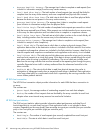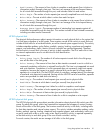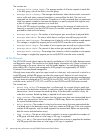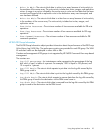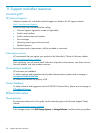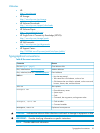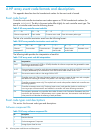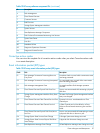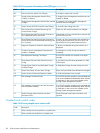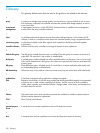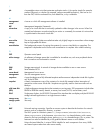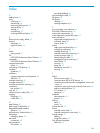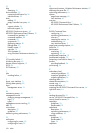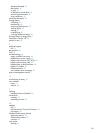H
help
obtaining, 94
host notification, 55
customized notification list, 56
individual hosts, 55
hosts
adding, 32
empty controller host ports, 66
HP
support website, 94
technical support, 94
HP P6000 Continuous Access , 42
HP P6000 Performance Data Collector, 70
command line interface, 80
command modifiers, 84
commands, 82
components, 70
displaying metrics, 85
filtering data, 87
friendly names, 77
overview, 70
TLViz formatter, 81
using Windows Performance Monitor, 85
I
I/O module, failed, 67
initializing the array, 45
Internet protocol supports, 15
iSCSI, 66
iSCSI devices, 52
J
jobs
avoiding failure, 41
L
layout, user interface, 11
limiting data quantity, 80
login
management server, 14
M
maintaining arrays, 45
management server
changing storage management, 51
login, 14
types, 7
management server event log, 53
MIB, 58
mirrorclones
description, 37
guidelines, 37
monitoring array performance, 70
N
notification
configuring for events, 55
configuring for hosts, 55
O
objects and counters, Windows Performance Monitor, 87
obtaining the parse file, 57
optimizing performance, 64
options
page footer message, 60
user interface, 60
overview
HP P6000 Command View, 7
HP P6000 Performance Data Collector, 70
P
P6000 Command View
configuring, 60
optimizing performance, 64
overview, 7
restarting the service, 64
troubleshooting, 64
user interface layout, 11
page footer message options, 60
parse file, 57
performance
monitoring, 70
optimizing, 40, 64
preallocated snapclone, 39
preallocated snapshot, 39
presenting virtual disks to hosts, 33
product
providing feedback, 94
provisioning, 26
R
redundancy level
container guidelines, 39
snapclone guidelines, 35
snapshot guidelines, 36
refreshing data, 80
related documentation, 94
remote copy, 42
remote replication, 42
restarting the HP P6000 Command View service, 64
right-click menu, 64
S
sending the event file, 59
service, HP P6000 Command View, 64
severity levels for events, 56
snapclone
guidelines, 35
preallocated, 39
snapclones
description, 35
optimizing performance, 41
using containers, 40
snapshot
guidelines, 36
preallocated, 39
types, 36
snapshots
104 Index



